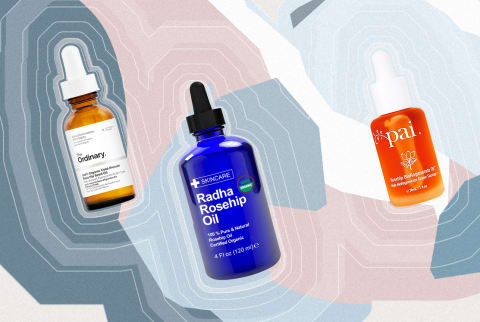Rosehip Seed Oil For Skin: A Guide To Benefits, Uses & More



Ask any skin care fan out there and they'll likely tell you their favorite oil, be it coconut, jojoba, or moringa seed. One that many find particularly appealing is rosehip seed oil. Don't take our word for it: "I LOVE rosehip seed oil. It's one of my favorite ingredients," said holistic dermatologist Cybele Fishman, M.D., who advises many of her clients, especially those with sensitive skin, to try rosehip.
She's not alone—rosehip seed oil is beloved by natural beauty experts because of its versatility. With a wide range of uses and benefits, it may be effective and gentle enough to replace your current go-to, if it hasn't already.
Advertisement
What is rosehip seed oil?
The name "rosehip" can be slightly misleading. Rosehip seed oil doesn't actually come from a rose or a rosebud. Instead, rosehip seed oil is the result of extracting the oils from a small bright-red berry-like seed pod of two types of wild roses—Rosa moschata or Rosa rubiginosa. The inside of a rosehip is a bright orange, which is where the oil gets its notorious bright orangey-red color.
"It's quite an arduous process to sustainably extract the oil from the small rosehip seeds," said aromatherapist and essential oil expert Leigh Winters. As a result, high-quality rosehip oil can be pretty pricey.
Benefits:
This potent little oil has a wide swarth of benefits, external and internal.
- Improves barrier function: "The gamma-linolenic acid (GLA) is an omega fatty acid that's excellent for maintaining a healthy skin barrier," Fishman said. Fatty acids are essential for strengthening your skin barrier function, by keeping your skin cell's natural lipids nourished.
- Brightens tone: Another reason it's a powerhouse for the skin is because it contains lots of complexion-brightening vitamin C, vitamin A via carotenoids, and may even have some protective properties against ultraviolet light1. Antioxidants are known to help improve tone, making skin appear more luminous and youthful.
- Supports collagen: Thanks to the vitamin C content, this can also help collagen formulation in the skin. Vitamin C is an essential part of the collagen synthesis process. When you apply it topically, it can aid your skin cell's fibroblasts (or what creates collagen) as well as stabilizes the collagen you already have.
- Protects skin from free radical damage: Additionally, because of said antioxidant powers, it can also protect skin from free radical damage and oxidative stress. These are some of the main reasons people experience premature aging.
- Rosehip supplements can help heal the gut: Rosehip is an especially potent healing plant, and the studies prove it. When taken internally, rosehip extract has been shown to help boost the health of the gut2. Another promising study suggested that oral supplementation of rosehips might be helpful3 in preventing obesity.
- An ideal oil for any skin condition: What's so great about this oil is almost all skin types can use it, notes Fishman. "Rosehip oil is a fantastic moisturizer that does not break people out. It's good for all skin types, especially dry or rosacea-prone," she adds.
- Great for hair: Because rosehip seed oil is a dry one, it's also an excellent natural anti-frizz treatment on the ends of dry hair. In case you haven't noticed the theme with rosehip oil: A little goes a long way!
- Helps with healthy aging: "The main bioactive component of rosehip seed oil is all-trans retinoic acid, which is a natural precursor to vitamin A. The high amount of tretinoin is responsible for making rosehip one of the best oils for restoring depleted and scarred tissue," said Winters. So it can help reduce the appearance and formation of acne scarring, too. Use it as a spot treatment to make the healing process more efficient.
Advertisement
Best rosehip seed oils.
Ready to try rosehip oil? Pai, a company that specializes in making products for sensitive skin, makes a biogenerate rosehip seed oil that's rich in color and comes in two sizes; the smaller version is budget-friendly and perfect if you're looking to test it out. Another budget-friendly, pure option is Radha Beauty's 100 percent organic, cold-pressed rosehip seed oil. Finally, cult-favorite skin care brand The Ordinary makes an organic, cold-pressed rosehip seed oil that sells for less than $10.
The takeaway.
The oil has many uses thanks to its nutrient dense profile—it covers hair, skin barrier function, scarring, and so on. If you are looking for a new, sophisticated oil to add to your routine, this is a great investment.
Advertisement

Lindsay Kellner is a freelance writer, editor and content strategist based out of Brooklyn, NY. She received her bachelor’s degree in journalism and psychology at New York University and earned a 200-hour yoga certification from Sky Ting. She is the co-author of “The Spirit Almanac: A Modern Guide to Ancient Self Care,” along with mbg’s Sustainability Editor, Emma Loewe.